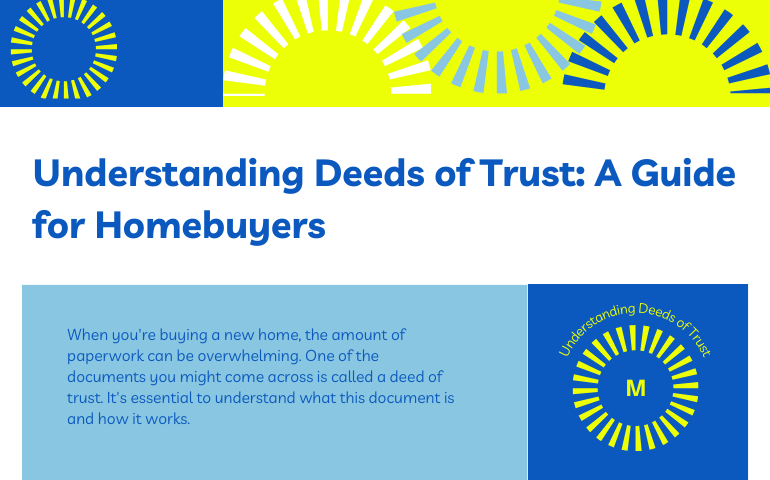
Mortgage Dove
Understanding Deeds of Trust: A Guide for Homebuyers
When you're buying a new home, the amount of paperwork can be overwhelming. One of the documents you might come across is called a deed of trust. It's essential to understand what this document is and how it works. A deed of trust is a legal agreement between a home buyer and a lender during the closing of a property deal. It specifies that the borrower will repay the home loan while the lender will hold the property’s legal title until the loan is fully paid off. In some states, a deed of trust is used instead of a mortgage for secured real estate transactions. In a deed of trust, there are three parties involved: To be a legally binding document, a deed of trust must include several key elements, such as: A deed of trust is like a contract that says the property you're buying will be used as collateral for the loan. This means that if you don't pay back the loan, the lender can take the property away from you and sell it to get their money back. But the lender doesn't hold onto the property themselves. Instead, they give it to a neutral third party, like a title company or a bank, who will hold onto it until you pay off the loan. This third party is called the trustee, and they're responsible for making sure the lender gets their money if you can't pay. Once you've paid off the loan, you'll get full ownership of the property. But if you can't pay, the trustee will take control of the property and sell it to pay off the loan. Many homeowners often mix up the terms “mortgage” and “deed of trust,” though they both serve the same purpose with a few distinctions. There are some important differences between deeds of trust and mortgages that you should know about: Some similarities between a deed of trust and a mortgage include the following: Trust deeds are a helpful tool for managing your finances, but they're not a good fit for everyone. They work best for people who have a steady income and can stick to regular payments. It's important to note that trust deeds can sometimes lead to faster foreclosures compared to regular mortgages. A deed of trust is a legal agreement between a borrower and a lender that takes place during a property deal. It specifies that the borrower will repay the home loan while the mortgage lender will hold the property's legal title until the loan is fully paid off. Although deeds of trust and mortgages have some differences, they both allow lenders to take back your home if you don't follow the terms of your loan. Trust deeds are a helpful tool for managing your finances, but they're not a good fit for everyone. It's important to understand what this document is and how it works before signing one during the closing of a property deal.Definition of Deed of Trust
How Deeds of Trust Work
Deed of Trust v. Mortgage
Differences
Similarities
Are trust deeds a good idea?
Bottom Line
"Mortgage Dove makes home financing convenient for every American. You can count on us to provide a home buying experience tailored to your personal needs and financial situation. We strive to give you the peace of mind that your home financing goals can be achieved.”

Mortgage®
www.mortgagedove.com



-and-how-does-it-work.png)